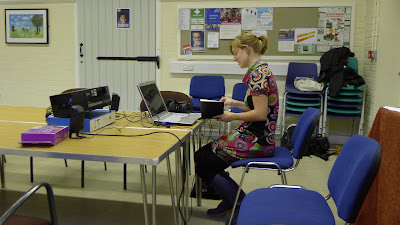Extending memories and personal skills
On Monday I had my first proper workshop related to my final project. I visited the Over 60s Group of the social community Time and Talents in Rotherhithe, who were so kind to let me do it. The aim was to tease out older people's memories about old media and above all the way they influenced them in every-day life.
Rule number one: in this country nothing ever works without tea and biscuits!!!
Rule number one: in this country nothing ever works without tea and biscuits!!!
Getting ready: projector highlighting my nose - works fine. next step?
Passing around my rotary dial telephone
(which I actually do use at home) to evoke memories.
And a camera from the 50s...
The best part about this workshop was again individual talks to people. This is when the elderly feel the attention and interest around them and thus open up, eagerly telling stories from the past.
What was really interesting is that indirectly I started tracking the specifics of social classes. Most of the participants were born in the 1930s-40s and spent their whole life in Rotherhithe, which means that they were either dockland or factory workers, pub cooks, etc. The docklands was one of the poorest areas in London in the middle of the century, people used to live in slums without electricity and bathroom in the house until 1960s. (I accidentally got this background knowledge by watching an exciting BBC documentary The Secret History of Our Streets, you can still watch it if you are in Britain.)
So naturally, most of these people did not have a particularly intense relationship with media, they had to work hard and spent most of their spare time outside rather than in the house. Another point which suddenly makes all the elderly very passionate is when they start talking about the youth of today and how impossibly often they use their telephones. I found it very amusing to hear an old lady complaining about young people discussing on their mobile what they are having for tea, while being in the supermarket. "I mean, why did not they just sit down at home and write a shopping list?"
I had an idea for the final exposition (which is by the way just in 3 weeks, aaaah!), but my tutor didn't like it at all. So I will have to come up with something new. And, what is much more important, do more research on this topic and think of different strategies. I need to figure out what is the most essential and interesting part of the research. Basically, I need to filter the crucial aspects of extension through media in the middle of the 20th century and how they differ from now...
More more more to come!












Nice, thanks!
ReplyDeleteIt seems to me, that the most of people on the photos were born in the 1920s, not in the 1930s-40s.
Is the dark-skinned boy studying with you?
Why? There are not over 90, at least not all of them.
DeleteWhich of the two boys do you mean?
One of them (with dreadlocks) is leading the elderly groups at Time & Talents and the other one is a volunteer.
Why? I don't said there are over 90, but I gues most of them are over 83 :)
ReplyDelete2012 - 83 = 1929 => born in the 1920s
Most look about my Mum's age and younger - she's in her 70s, born in 1934. There's a couple of older looking ones too. My Mum doesn't think she's old at all and absolutely refuses to think of me as middle-aged (which I am - if I live to be 102!)
ReplyDeleteAnd she is absolutely right. It's about how old you feel, not how old you actually are ;)
DeleteSo maybe I should interview your mum instead? :)